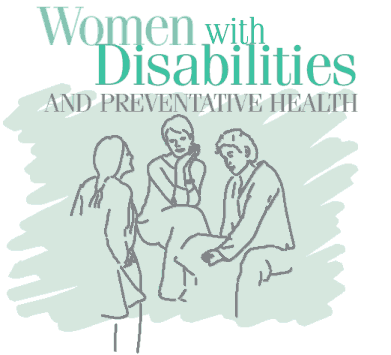Women with Disabilities: What You Should Know About Preventive Health Care
What You Should Know:

If you are a woman with a disability it is important to remember that, along with tending to your disability-related health needs, you also need to practice good health habits. Use the information in this fact sheet when discussing your health concerns with your health care provider.
Women who have disabilities are faced with many stereotypes. It is important that everyone, including health care professionals, understand that having a disability is not the same as being sick. Women with disabilities are women first. Women with disabilities have as much, if not more, need to be proactive about their overall health. Here are some tips for achieving optimal health:
Eat a Healthy Diet
Try to maintain a diet that's rich in fruits, vegetables and whole grains, and low in fat. If you rely on someone else to make your meals, work with that person to find a healthy diet that suits your needs and tastes.
Get Regular Exercise
Staying fit will help prevent or delay the onset of many secondary health problems, including heart disease, high blood pressure, osteoporosis, excess weight gain, or depression. Physical activity is good for your body because:
- It energizes, and increases stamina and strength.
- It enhances mobility.
- It may reduce spasticity.
- It keeps joints, tendons and ligaments flexible for easy, unrestricted movement.
Although you may have challenges in accessing equipment and facilities, there are resources to assist you in developing and maintaining regular exercise. Contact your health care providers, local health organizations, social services agencies or a YMCA. The National Center on Physical Activity and Disability has excellent information. It can be found at www.ncpad.org. For more ideas on staying fit please see "Fit for Life".
Avoid Tobacco, Excess Alcohol and Illegal Drugs
These substances can be even more dangerous if you already have other health problems. Talk with your health care provider about help with a drug or alcohol problem. If you smoke, quit. The New York State Smokers' Quitline at 1-866-697-8487 offers free and confidential assistance. If you are eligible, Medicaid can pay for smoking cessation aids, such as the nicotine patch.
Get Preventive Care
If you have a disabling condition, it's important to get regular preventive health care along with any disability related care that you may need. While some of the barriers to health care have been reduced for people with disabilities, many others remain, such as lack of information, providers' attitudes, costs of care, access to health care sites, accessible examination equipment and communication problems.
Get Recommended Reproductive and Gynecological Care
Finding a healthcare provider with whom you feel comfortable is critical. The National Center for Research on Women with Disabilities reports that women with physical disabilities find it difficult to obtain information about birth control methods that are safe and effective options for them. Also, although they may intend to have regular pelvic exams, they are often discouraged by inaccessibility and other barriers in physicians' offices. Women with disabilities report that many physicians do not conduct pelvic exams if providing assistance with transfers onto an exam table is seen as being too difficult, is not allowed under a facility's policies, or if spasticity, contractures or pain creates problems with positioning.
While many women with disabilities have no unusual problems with pregnancy, physicians need to be alerted to possible pregnancy complications associated with spinal cord injury (SCI), such as autonomic dysreflexia in women with lesions at or above the T6 level; respiratory compromise; skin breakdown; increased risk of urinary tract infections; increased spasticity; and medications commonly used in SCI that could be toxic to the fetus. Clinical guidelines for women with SCI are often based on case reports or small case studies that tend to report only the most unusual and serious problems. Unfounded assumptions of poor outcomes can cause clinicians to behave as though risks are greater than they actually are, and to practice defensive medicine.
If you are thinking about having a baby, take a proactive role with your health care provider and discuss these issues and concerns.
